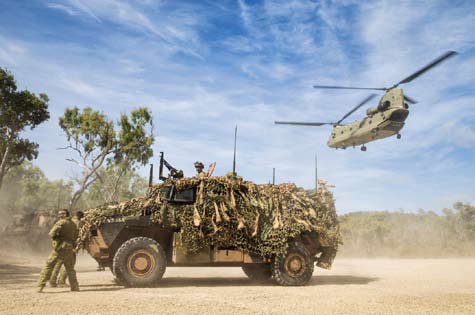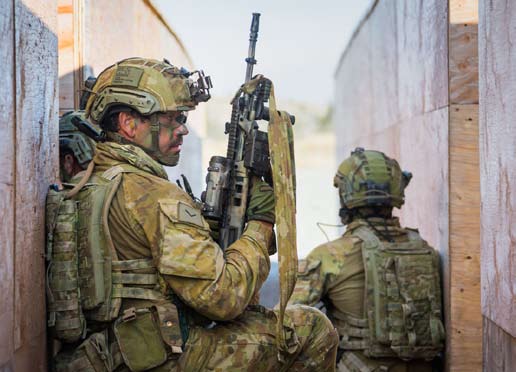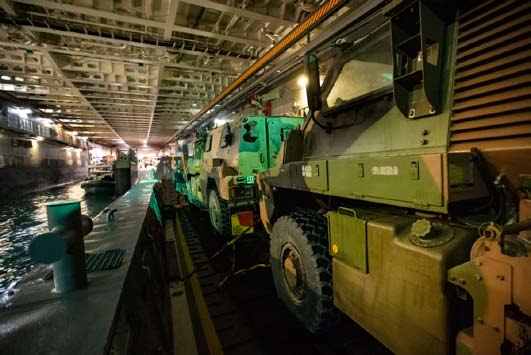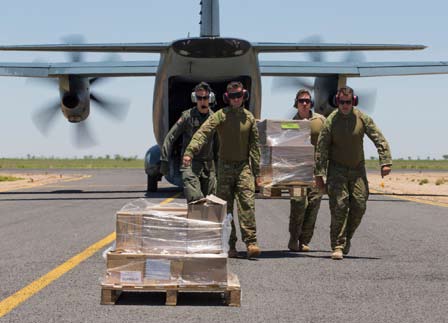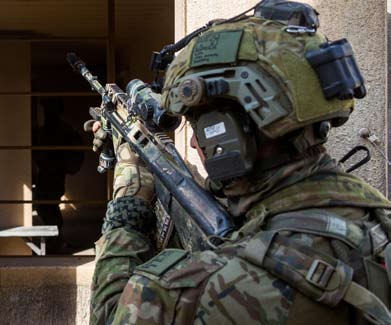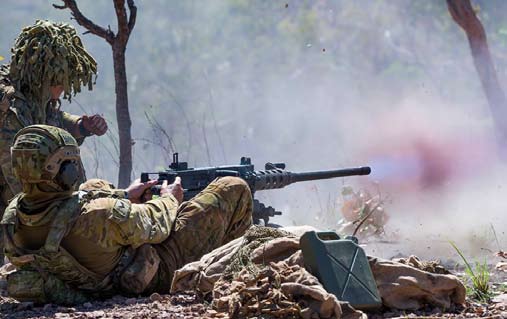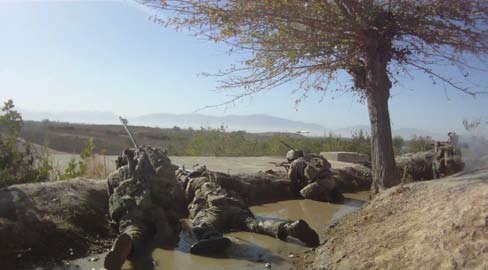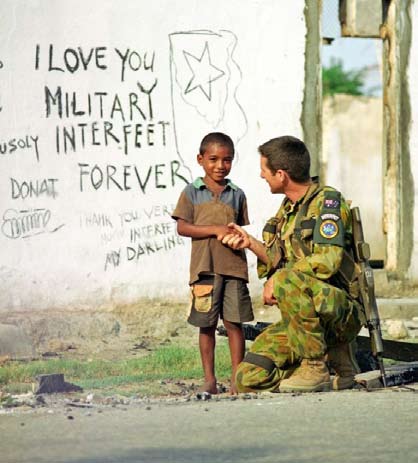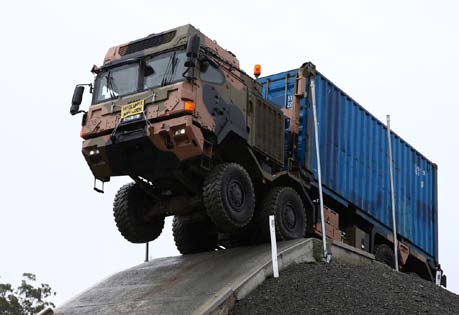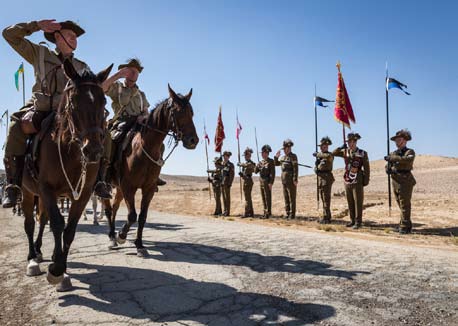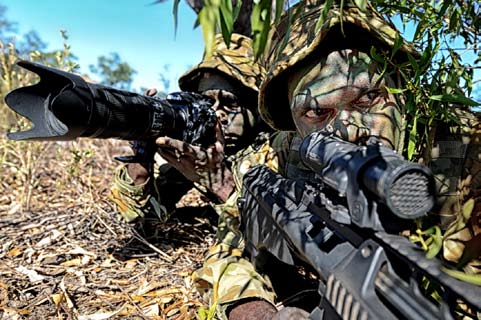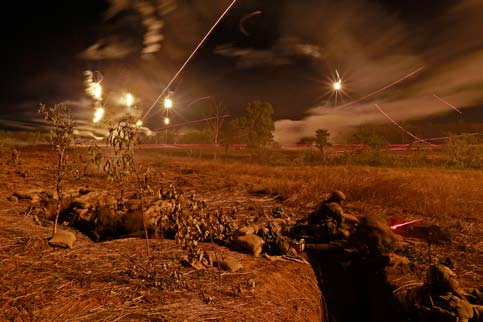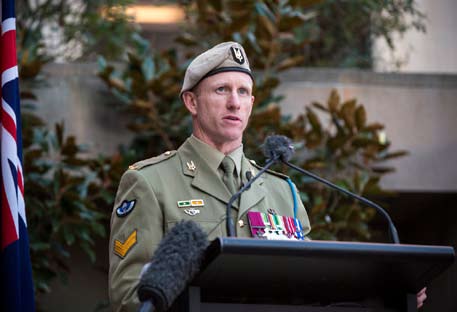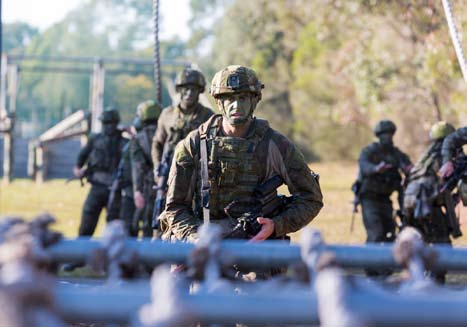Australian Army Reading List 2019
We studied everything we could get our hands on. You start working hard right from the first. You can’t say later in life I will start studying. You have got to start in the beginning.
Omar Bradley
Introduction
This reading list is designed to prepare you for service.
The profession of arms is the most unforgiving and competitive of professions. The consequences of failing are significant for yourself, your comrades and the nation you serve. Training, preparing for and participating in competition and conflict is a dangerous and difficult charge and more is required of a military professional than can be inculcated through training.
Your free or unregulated time is an opportunity to understand more about the profession you have chosen with a view to gaining an advantage against an adversary in the future. Reading allows you to develop and grow into the profession of arms, so that in times of conflict you are better prepared for its conduct.
A large number of the books in this reading list can be described as military history with a healthy selection on the Australian Army’s experience in war. The books provide a corpus of knowledge about past events, their context and how victory or defeat occurred. They also provide you with experience in analysing events, developing a coherent argument and acquiring the intellectual tools that you can use to solve the problems and challenges of the future. This combination of gaining experience from the past and developing one’s own skills for the future, through reading and reflection, is an essential part of how Army fulfils its mission of preparing land forces for war. It also assists members in understanding how an Army in Motion benefits from a contest of ideas and that reading can enhance the relevance of this contest.
Many of the works listed are enduring and will assist the reader in the ‘whatever comes next’ challenge of the current, uncertain security environment. There is no expectation that you will read every work on the list, however you should know that during the course of your career many of the titles will greatly assist you in realising your potential and preparing yourself and your troops for an unknown future.
It is important to remember that professional reading in breadth (a wide range of subjects), depth (one or two subjects in detail) and context is as important in the development of the military professional as is training, experience and formal education.
All members of the Army, no matter your rank or corps, are encouraged to make regular use of this reading list.
Philosophers of War
If Thucydides, Sun-tzu, and Clausewitz did not say it, it probably is not worth saying.
Colin Gray
These three works have each made a substantial contribution to the theory of war. During your career, take the time to read and reread them.
The Art of War
Sun Tzu
Sun Tzu was a Chinese military theorist who lived in the 6th century BCE. His most famous work, The Art of War, uses simple, descriptive language that anyone can read and apply to a variety of adversarial situations from military thought to business and beyond.
The Landmark Thucydides: A Comprehensive Guide to the Peloponnesian War
Robert Strassler
Thucydides is considered to be the father of the Realist school of International Relations theory and the first great participant-historian, in his case, in the war between Athens and Sparta that changed the ancient world. The above translation is highly recommended.
On War
Carl Von Clausewitz
On War is essential reading; not in a single sitting but thoughtfully considered over the course of a career. The translation by Peter Paret and John Howard is recommended.
Military Theory
No study is possible on the battlefield; one does there simply what one can in order to apply what one knows. Therefore, in order to do even a little, one has already to know a great deal and know it well.
Ferdinand Foch
Most writing on war deals with the techniques and forms of war; it is really about warfare, not war as a phenomenon. Much ‘theoretical’ writing on war is, similarly, intensely practical and utilitarian in its concerns. As Clausewitz observes, war has a nature and character; the former does not change while the later changes constantly.
Contemporary Military Theory: The Dynamics of War
Jan Angstrom and Jerker Widen
This book provides an introduction to both classical and modern military theories and covers such areas as how we should understand the changing character of war, the utility of force, and how the pursuit of political ends is achieved with military means.
Deciphering Sun Tzu: How to Read the Art of War
Derek Yuen
Yuen’s comprehensive analysis of Sun Tzu, based on a close reading of the Chinese sources, explains its historical, philosophical, strategic, and cross- cultural significance.
On Clausewitz: A Study of Military and Political Ideas
Hugh Smith
Hugh Smith presents Clausewitz’s central ideas about war and politics— such as war as an instrument of policy, the concept of Absolute War, friction, and the fog of war—in a clear and systematic fashion.
The Evolution of Operational Art: From Napoleon to the Present
John Olsen and Martin van Creveld (eds)
This collection of essays is highly instructive, examining ‘not only the flashes of genius and intellectual apexes, but also the periods devoid of creative thinking’ in the evolution of operational art over time.
Harsh Lessons: Iraq, Afghanistan and the Changing Character of War
Ben Barry
Barry examines ‘strategic, operational, tactical and technical adaptations and adjustments during the wars [in Afghanistan and Iraq] to show how strategy, campaign design, and military capability evolved’.
Lessons Learned: Learning from the Long War
Richard Hooker and Joseph Collins
Written for a senior military audience, the reports in this book present something of a rough draft of the history of the ‘long war’ in Afghanistan and Iraq that began in 2001 and the many ‘lessons encountered’ during this experience.
Endurance and War: The National Sources of Military Cohesion
Jasen Castillo
Castillo’s argument builds on insights from the literature on group solidarity in general and military effectiveness in particular, which argue that the stronger the ties which bind individuals in a group, the higher the degree of cohesion that a group will exhibit when taking collective action, including fighting in war.
Masters of War: Classical Strategic Thought
Michael Handel
Handel provides an analysis of the classical works on war by Clausewitz, Sun Tzu, Mao Tse-tung, and, to a lesser extent, Jomini and Machiavelli by providing a fresh look at what these strategic thinkers actually said and not what they are widely believed to have said.
Military Power: Explaining Victory and Defeat in Modern Battle
Stephen Biddle
Biddle examines the emergence of what he terms ‘the modern system’ of combined-arms warfare and concludes that the close collaboration of
infantry, armour and fire support with all arms and services is indispensable to survival and victory on the modern battlefield.
Forging Australian Land Power: A Primer
Albert Palazzo
This thought-provoking, short monograph argues for the enduring utility of land power and offers ‘seven truths’ so that the ‘past can be understood and the future illuminated’.
Strategic
The degree of force that must be used against the enemy depends on the scale of the political demands on either side.
Carl von Clauswitz
The British military thinker, Basil Liddell Hart, defined strategy as ‘the art of distributing and applying military means to fulfil the ends of policy’. The
relationship between ‘ends’ and ‘means’ has become of acute interest, once again, in the aftermath of the wars in Iraq and Afghanistan.
Modern Military Strategy: An Introduction
Elinore Sloane
Sloane provides a broad introduction to strategy, with chapters on the conduct of war in naval, land, air, space and cyber dimensions, and on nuclear strategy, irregular war and counterinsurgency.
Strategy: Key Thinkers
Thomas Kane
Kane introduces the ideas of major strategic thinkers whose work explores the complex challenges associated with the use of military force.
Makers of Modern Strategy: From Machiavelli to the Nuclear Age
Peter Paret (ed)
This book focuses on the strategic ideas of all major theorists over the past 500 years and each essay succeeds in placing its topic into its political, social, and economic context.
Military Strategy: A General Theory of Power Control
Joseph Wylie
Admiral Wylie provides a framework for how strategy, whether conducted sequentially or cumulatively, can be understood as a means of control.
Strategy for Action: Using Force Wisely in the 21st Century
Commodore Steven Jermy
A UK practitioner’s view of strategy that examines why modern militaries have struggled in recent conflicts to realise strategic aims.
Modern Strategy
Colin Gray
In this comprehensive account, Gray addresses the ‘characteristically “modern” expression of the ageless phenomena of strategy’.
Strategic Studies: A Reader
Thomas Mahnken and Joseph Maiolo (eds)
This collection of key essays provides a wide range of views on both the theory and practice of contemporary and classic scholarship.
Supreme Command: Soldiers, Statesmen, and Leadership in Wartime
Elliot Cohen
In his case studies of Abraham Lincoln, Georges Clemenceau, Winston Churchill, and David Ben-Gurion, Cohen offers compelling insights about the relationship between political leaders and their military subordinates during wartime.
American Warlords: How Roosevelt’s High Command Led America to Victory in World War II
Jonathan Jordan
This book highlights the challenges of working through personal and political differences to achieve a strategic end by closely following President Roosevelt’s high command during the Second World War.
Dereliction of Duty: Lyndon Johnson, Robert McNamara, the Joint Chiefs of Staff, and the Lies that Led to Vietnam
Herbert McMaster
McMaster argues that the ‘war in Vietnam was not lost in the field, nor on the front pages of the New York Times or the college campuses. It was lost in Washington, DC’.
Landing Helicopter Dock of the Royal Australian Navy.
Joint
The soldier cannot function alone. His flanks are bare, his rear is vulnerable, and he looks aloft with a cautious eye. He needs the airman and the sailor for his own security in doing his own job.
Joseph Wylie
Army fights as part of a joint force which aims to be greater than just the sum of its parts. The titles below will aid the Army reader in understanding some of the advantages and disadvantages of various other elements of the joint force that enable him or her to win.
Making the Australian Defence Force
David Horner
This book traces how the ADF’s success as a joint military force was hard-won over years of trial and error in peacetime exercises, and how new organisations and techniques were refined in the Gulf War, Cambodia, Somalia, Rwanda, and Bougainville.
A Maritime School of Strategic Thought for Australia - Perspectives
Justin Jones (ed)
As Geoffrey Till points out in this collection of essays, a truly effective maritime strategy must account not only for national circumstances and the demands of the moment but also strike ‘a balance between its naval and land components’.
Airpower for Strategic Effect
Colin Gray
Gray’s careful development of airpower’s ‘strategic narrative’, as he calls it, shows convincingly how the relative criticality of the air weapon in joint warfare is neither universal nor unchanging but rather is crucially dependent on a war’s particular circumstances.
Amphibious Assault: Manoeuvre from the Sea. From Gallipoli to the Gulf—A Definitive Analysis
Tristan Lovering (ed)
This edited work offers 35 case studies of amphibious operations—from the landing at Gallipoli in 1915 to the one on the Al Faw Peninsula in 2003—all set within the context of a ‘manoeuvrist approach’.
Dark Territory: The Secret History of Cyber War
Fred Kaplan
Taking its title from former US Secretary of Defense Robert Gates’ comments that when it comes to the questions of conflict in the digital age, ‘we’re wandering in dark territory’; this book explores the subject in a history-by-story approach.
Space Warfare: Strategy, Principles and Policy
John Klein
Drawing on the concepts of naval historian and geostrategist Sir Julian Corbett, Klein presents a maritime-based strategic framework for the pursuit of national interests and the conduct of military operations in space.
Operational
So the important thing in a military operation is victory, not persistence.
Sun Tzu
An intermediate link between strategy and tactics has always existed. However, while operational art and thought as a distinct concept encompassing campaign planning and major combat operations is perhaps two hundred years old, it has been studied intensively only relatively recently. The Soviet military theorist Alexander Svechin stated that ‘tactics makes the steps from which operational leaps are assembled; strategy points out the path’.
From Victory to Stalemate: The Western Front, Summer 1944 - Decisive and Indecisive Military Operations, Volume 1
Charles Dick
Rather than detailing the campaign of the Western Front, Dick focuses on operational art and the application (and misapplication) of command, doctrine, manoeuvre, intelligence, and logistics as the Anglo-American armies conducted major combat operations in the summer of 1944.
From Defeat to Victory: The Eastern Front, Summer 1944 - Decisive and Indecisive Military Operations, Volume 2
Charles Dick
This book describes the precise application of the operational art by the Soviet Army in the summer of 1944. The author discusses the development of Soviet operational art before the war, the devastating campaigns of 1941, 1942 and 1943, and how the Soviets adapted the lessons from those years into its successful operations in 1944.
Blitzkrieg to Desert Storm: The Evolution of Operational Warfare
Robert Citino
Citino, in a series of case studies beginning with the German campaigns of 1940 and ending with the American Army’s post-Vietnam resurgence, grapples with issues common to many armies, including the merits of centralised and decentralised command and control, the relative importance of fire and manoeuvre, and the pursuit of decisive victory.
Military Adaptation in War: With Fear of Change
Williamson Murray
Armies may get the next war wrong but, as Murray highlights in studies of the First and Second World Wars and the Yom Kippur War, they are also capable of adapting to the new conditions in the midst of a war.
The Seeds of Disaster: The Development of French Army Doctrine, 1919-39
Robert Doughty
This book explains how the French Army prioritised preparation over improvisation and had ‘formulated a doctrine, organised and equipped units, and trained its soldiers for the wrong type of war’, ultimately leading to the French Army being crushed in 1940.
Operation Phantom Fury: The Assault and Capture of Fallujah, Iraq
Dick Camp
Employing more than 150 images and drawing on personal interviews ranging from section member to commanding general, this work captures both the sweep of operational and tactical plans and individual decisions in combat to provide an engaging account of how US Army and Marine units fought for and secured Fallujah in one of the distinctive actions of the Iraq War.
The Myth and Reality of German Warfare: Operational Thinking from Moltke the Elder to Heusinger
Gehard Gross
Gross provides a critical assessment of the German army’s ‘war of movement’, or Bewegungskrieg, an approach employing operational art, mission command, and manoeuvre in an effort to achieve a quick and decisive decision.
War, Strategy and Military Effectiveness
Williamson Murray
These thoughtful essays by Murray ‘rest on the proposition that war is neither a science nor a craft, but rather an incredibly complex endeavour which challenges men and women to the core of their souls’.
Counterinsurgency Warfare: Theory and Practice
David Galula
Much quoted but not always closely read, Galula offers insight about the importance of the population being fought for (and over), the place of kinetic action, and the argument that ‘the counterinsurgent is tied to his responsibilities and his past... [and] can seldom cover bad or non-existent policy with propaganda’.
Tactical
We have gotten into the fashion of talking of cavalry tactics, artillery tactics, and infantry tactics. This distinction is nothing but a mere abstraction. There is but one art, and that is the tactics of the combined arms.
Gerald Gilbert
Tactics is the art of winning battles, from the smallest action to the engagement of entire armies. Some of the titles presented here are broad in their sweep while others provide detail on specific tactical concepts. This provides the reader with a good introduction to fighting and winning battles.
Not Mentioned in Despatches: The History and Mythology of the Battle of Goose Green
Spencer Fitz-Gibbon
This book provides a hard-hitting critique of command style and failure by examining the system of ‘restrictive control’, accepted doctrine in the British army of 1982, and comparing it with ‘directive control’ (mission command) as employed during the Falklands War.
Combined Arms Warfare in the Twentieth Century
Jonathan House
House provides a comparative study of the development of combined arms warfare during the last century, including the trade-offs involved in employing ‘heavy’ and ‘light’ forces, and the enduring obstacles to effective cooperation between air and land forces.
The Battle of Maryang San: 3rd Battalion, The Royal Australian Regiment Korea, 2-8 October 1951
Bob Breen
Breen provides the reader with a deep understanding drawn from personal accounts from the CO down, of 3 RAR’s classic assault to capture Maryang- san (Hill 317).
The Search for Tactical Success in Vietnam: An Analysis of Australian Task Force Operations
Andrew Ross, Robert Hall and Amy Griffin
Based on quantitative analysis, this study examines the thousands of small contacts and actions of the low-intensity, irregular war that characterised the majority of Australia’s operations, and argues that the Task Force outfought its enemy during counter-insurgency operations.
On Infantry
Bruce Gudmundsson and John English
An indispensable overview of the development of infantry since the 1850s, the authors examine such issues as tactical employment, organisational change, and the growing importance of sections and fire teams.
On Tactics: A Theory of Victory in Battle
BA Friedman
Rather than offering a theory of tactical warfare, Friedman provides a readable primer that presents a survey of different schools of thought about ground combat at the lowest level.
Margin for Victory: Five Battles that Changed the Face of Modern Warfare
Douglas Macgregor
Focusing on ‘wars of decision’, Macgregor argues passionately for military reform and reorganisation in order to successfully meet future challenges— the lesson here is that change is constant and we must be ready for it.
Battling the Elements: Weather and Terrain in the Conduct of War
Harold Winters (author), Gerald Galloway Jr (contributor), William Reynolds (contributor) and David Rhyne (contributor)
‘Weather: no effect’ has been said too often during the delivery of orders but this book reminds us otherwise, highlighting that ‘the basic elements of geography and weather are always important factors in the conduct and outcome of battle’.
Combat Motivation: The Behaviour of Soldiers in Battle
Anthony Kellet
Kellet analyses the behaviour of soldiers in battle and articulates the importance of the primary group to unit cohesion and how training, discipline, and leadership influence its development.
The Bear Went Over the Mountain: Soviet Combat Tactics in Afghanistan
Lester Grau (ed)
Consisting of ‘lessons learned’ vignettes prepared by junior and field-grade officers, this book does not shy away from identifying errors or apportioning blame about the Soviet experience in Afghanistan in the 1980s.
Fighting by Minutes: Time and the Art of War
Robert Leonhard
Leonhard deduces that ‘time is increasingly becoming [war’s] critical dimension’ and this work expands this deduction by articulating a framework for military practitioners to consider when thinking about tactics.
Command, Leadership and the Profession of Arms
Don’t begrudge the time you spend developing, coaching and helping your people to grow so they can carry on when you’re gone. It’s one of the best signs of good leadership.
Bernard Baruch
The highest duty of a commander is to decide when and how to take or save human lives and to do so in accordance with the rules of law and bound by the ethics of society. The works in this section offer the reader guidance as to how commanders have fulfilled this solemn duty.
The Profession of Arms
General Sir John Hackett
Hackett describes the military as primarily a virtuous institution built around courage, duty, and loyalty, and that leadership is the supreme requirement of the officer—a higher duty than the mastery of tactics or logistics.
Leadership: The Warrior’s Art
Christopher Kolenda (ed)
This wide-ranging anthology uses case studies from Alexander the Great through to the Second World War to highlight the timeless principles of leadership in the crucible of combat.
The Challenge of Command: Reading for Military Excellence
Roger Nye
A handbook for mentors and junior leaders alike, Nye considers commanders as warriors, tacticians, strategists, and moral arbiters within the context of the challenges faced.
The Mask of Command
John Keegan
Keegan contrasts the styles of Alexander the Great, the Duke of Wellington, Ulysses Grant, and Adolf Hitler to reflect on the changing character of command, prompting us to consider what a ‘post-heroic’ leader might look like.
Transforming Command: The Pursuit of Mission Command in the US, British and Israeli Armies
Eitan Shamir
Mixing organisational analysis with sociology and history, Shamir examines how the American, British, and Israeli armies have adopted and practiced ‘mission command’.
The Leader’s Bookshelf
Admiral James Stravridis and R Manning Ancell (eds)
The authors surveyed over two hundred active and retired four-star military officers on their reading habits and the books that influenced their leadership; the result is a book that provides a valuable list of titles and advice for military readers and leaders.
Defeat into Victory: Battling Japan in Burma and India, 1942-1945
Field Marshal Sir William Slim
The classic memoir of the war in Burma and India by the XIVth Army’s commander, who hoped, in part, to ‘give, to those who have not experienced it, some impression of what it feels like to shoulder a commander’s responsibilities in war’.
Men Against Fire: The Problem of Battle Command in Future War
SLA Marshall
Marshall offers an insight into the need for leaders to understand their soldiers and train them accordingly for the close fight.
Thoughts on Generalship: Lessons from Two Wars
Major General Stephen Day
Based on his experience in Iraq and Afghanistan, Day offers eight lessons, the first of which is that ‘your fundamental duty is to win’, and three thematic observations: ‘generalship is an intellectual endeavour’; ‘once intellect is applied to the challenge ahead, a general must resolutely commit to achieving it and be bold in its execution’; and ‘the drive for success must accommodate compassion’.
Ethics
Educating the mind without educating the heart is no education at all.
Aristotle
Works on ethics are designed to provide leaders with insights they can use to develop themselves and their organisations so that they are better prepared for the challenges they may face in their service in the profession of arms.
Black Hearts: One Platoon’s Descent into Madness in Iraq’s Triangle of Death
Jim Frederick
Fredrick describes how a platoon which suffers the loss of key leaders can descend into brutality, substance abuse, and madness—with horrific results.
Ethics and Cyber Warfare: The Quest for Responsible Security in the Age of Digital Warfare
George Lucas
This thought-provoking book highlights the various legal and moral considerations if cyber war is to be specifically codified within existing International Law.
The Logic of Violence in Civil War
Stathis Kalyvas
Kalyvas provides an account of what causes violence in civil war and specifies a novel theory of ‘selective violence’, which argues that violence is jointly produced by political actors seeking information and individual civilians trying to avoid the worst, but also grabbing what opportunities their predicament affords them.
Just and Unjust Wars: A Moral Argument with Historical Illustrations
Michael Walzer
Spanning the Athenian attack on Melos to the My Lai massacre to Afghanistan, Walzer mines historical accounts and the testimony of participants, decision makers, and victims to explain when war is justified and what ethical limitations apply to those who wage it.
Moral Dilemmas of Modern War: Torture, Assassination, and Blackmail in an Age of Asymmetric Conflict
Michael Gross
As the subtitle suggests, this book examines some contentious issues in modern warfare, including limitations on the use of both lethal and non-lethal weapons, assassination and targeted killing, terrorism and counter-terrorism, and humanitarian military intervention.
Logistics
Logistics considerations belong not only in the highest echelons of military planning during the process of preparation for war and for specific wartime operations, but may well become the controlling element with relation to timing and successful operation.
Vice Admiral Oscar Badger
Logistics is the science of planning, and the carrying out of the movement and maintenance of forces. It is an essential component of all military activities and has long resided at the heart of success in all levels of conflict.
Supplying War: Logistics from Wallenstein to Patton
Martin van Creveld
Van Creveld highlights the importance of logistics in military operations and charts the main developments across salient campaigns from 1630 to 1945.
Logistics in the Falklands War: A Case Study in Expeditionary Warfare
Kenneth Privratsky
Privratsky provides a comprehensive account of how the British Task Force was assembled and provided with everything required to mount an amphibious operation 12,000km from the national base, the naval problem of unloading stores under frequent air attack, and how forces landed ashore received (or did not receive) support during the advance on and capture of Port Stanley.
Moving Mountains: Lessons in Leadership and Logistics from the Gulf War
William Pagonis
General Pagonis recounts the Gulf War from the first fateful telephone call, to the mobilisation of 550,000 troops and the shipment of 7,000,000 tLoongsistics of supplies, to the enormously complex challenge of bringing home a half million soldiers and their equipment.
Alexander the Great and the Logistics of the Macedonian Army
Donald Engels
A detailed analysis of the logistic, organisational and movement challenges faced and solved by Alexander and his Army.
Red and Green Life Machine: Diary of the Falklands Field Hospital
Rick Jolly
Jolly and his team of 120 doctors, nurses and medical assistants carried out more than 200 major operations on casualties from both sides through the three weeks of the intense and violent conflict, often working through the night in freezing surroundings, lit only by torchlight and often under air attack.
The Lieutenant Don’t Know: One Marine’s Story of Warfare and Combat Logistics in Afghanistan
Jeff Clement
An informative book that provides the reader with a real appreciation of the challenges of tactical level logistics in navigating the hostile and difficult terrain of Helmand province, where the supply routes between Camp Leatherneck, and the various remote outposts were described as either ‘bad’ or ‘worse’.
Australian Military History
We cannot escape our past. Our whole culture – the way we think, the way we look at ourselves and others, our institutions, are the product of national experience.
Eustace Keogh
History remains the best, most detailed, and perhaps only sure guide to understanding the possible future we face. The titles below provide a small selection of the wealth of Australian military history works available.
The Australian Army: A History
Jeffrey Grey
Jeffrey Grey was a leading teacher, scholar, and advocate for military history who cared deeply about the Australian Army and its people; this volume addresses the institution’s shortcomings and failures as well as its triumphs and successes.
A Military History of Australia
Jeffrey Grey
Grey provides a detailed, chronological narrative of Australia’s wars across more than two hundred years, set in the contexts of defence and strategic policy, the development of society, and the impact of war and military service on Australia and Australians.
The Australian Army: A History of its Organisation, 1901-2001
Albert Palazzo
Palazzo’s study of the Army from Federation through to the turn of the 21st Century is an important resource for understanding the changes to the institution, the development of the field army, the shifting relationship between full-time and part-time components, and the evolution of the machinery for their higher direction.
The Black Diggers: Aborigines and Torres Strait Islanders in the Second World War
Robert Hall
As Hall notes, the contribution made by indigenous Australians during the Second World War ‘put beyond reasonable question their right to a place in the “digger legend” - and reinforced their claim to be respected Australian citizens’.
Australian Battalion Commanders in the Second World War
Garth Pratten
This is an outstanding analysis of infantry battalion command that strips away popular stereotypes, showing that soldiers had the most faith in commanding officers on whose professional competence they could trust and rely, regardless of whether they conformed to populist ideas of what a commanding officer should be.
Monash as a Military Commander (2018 edition)
Peter Pedersen
A detailed account of John Monash’s development as a commander, from the difficulties he experienced leading his brigade at Gallipoli to his successes with the Australian Corps on the Western Front in 1918.
The Kokoda Campaign 1942: Myth and Reality
Peter Williams
Williams provides a balanced account of the Kokoda campaign, one that gives the reader a valuable understanding of how both sides conducted operations in challenging conditions.
Strategic Command: General Sir John Wilton and Australia’s Asian Wars
David Horner
General Sir John Wilton was one of the most significant senior officers that the Australian Army has produced and his story provides lessons on a number of levels—staff officer and tactician, institutional manager and innovator, and strategic operator.
A Soldier’s Soldier: A Biography of Lieutenant-General Sir Thomas Daly
Jeffrey Grey
As Grey relates, General Sir Tom Daly was a highly competent commander, a skilful staff officer, and was one of the most influential post-war service chiefs, notably shaping Army’s development during the Vietnam War.
Combat Battalion: The Eighth Battalion in Vietnam
Robert Hall
While Hall’s main focus is on 8 RAR’s story, he goes beyond the simple re- telling of the unit’s operations by dealing with the full range of the Australian soldier’s experiences, including issues of morale, unit cohesion, and personal response to combat.
Guarding the Periphery. The Australian Army in Papua New Guinea, 1951-75
Tristan Moss
Moss explores the operational, social, and racial aspects of the Pacific Islands Regiment during the height of the colonial era in PNG and during the progression to independence.
Gallipoli
Les Carlyon
Les Carlyon’s book is an important overview that looks at all aspects of the campaign, including Churchill’s original idea, the disastrous mix of commanders, the Turks, the battles, and the telling effect of the terrain.
Regional Context
We’ve gone from a planet ruled by natural geography to political geography to kinetically functional geography to a cyber geography that is ruled by ideological variation rather than politically constructed borders.
James Scott
It is important to understand the context of the region of which Australia is a part. This small selection of titles provides information on aspects of the region’s history and also some of its contemporary challenges.
Asia’s Cauldron: The South China Sea and the End of a Stable Pacific
Robert Kaplan
Combining hard-nosed geopolitics, history, and travelogue, Kaplan’s book summarises a turbulent moment in the Pacific and why the South China Sea is ‘on the way to becoming the most contested body of water in the world’.
Restless Empire: China and the World Since 1750
Odd Arne Westad
China’s rising influence on the world stage has shown what the country stands to gain from international cooperation and openness but, as Westad shows, the nation’s success will ultimately hinge on its ability to engage with potential international partners while simultaneously safeguarding its own strength and stability.
Monsoon: The Indian Ocean and the Future of American Power
Robert Kaplan
Once a strategic backwater, Kaplan argues that the region between the Horn of Africa and Indonesia is now a place where ‘global power dynamics will be revealed’.
The Silk Roads: A New History of the World
Peter Frankopan
Silk Roads is full of interesting insights and details about how these trails and roads connecting East and West facilitated trade, conquest, the spread of ideas, culture and religion, and why they have continued relevance for today.
Indonesian Destinies
Theodore Friend
Friend’s remarkable work provides a narrative of Indonesia during the last half century, from the post-war revolution against Dutch imperialism to the promise of today.
A History of Modern Indonesia since c. 1200: Fourth Edition
Merle Ricklefs
This well balanced study of Indonesia focuses mainly on post-independence Indonesia, primarily under Sukarno and Suharto, and provides valuable information on how Indonesia developed its national identity through colonialism, Islam, and nationalism.
A Military History of India and South Asia
Daniel Marston and Chandar Sundaram (eds)
This study examines the history of the military in India from colonial times to Partition, the wars with Pakistan and China, the insurgency in Sri Lanka, and India’s nuclear policy.
A Short History of South-East Asia
Peter Church
Straddling the boundary between travel guide and academic tome, Church offers succinct country-by-country historical summaries for each member of the Association of South East Asian Nations (ASEAN).
An Australian Experience
No matter how far I have traversed around this earth, I have yet to find another location that rivals Australia. Nowhere else on earth can you find such spectacular landscapes, such unique and fascinating animals, and such warm friendly people. This is why I will always call Australia home.
Adam Cropp
This section provides a wide range of titles from classic literature to history that contribute to an understanding of Australia.
Poor Fellow My Country
Xavier Herbert
Winner of the Miles Franklin Award on first publication in 1975, Poor Fellow My Country is set during the late 1930s and early 1940s but it is not so much a tale of this period as the author’s analysis and indictment of the steps by which we came to be the Australia of today.
A Fortunate Life
Albert Facy
This autobiography by Albert Facy chronicles his early life in Western Australia, his experiences as a private in the 11th Battalion during the Gallipoli campaign in the First World War, and his return to civilian life after the war.
The Narrow Road to the Deep North
Richard Flanagan
The 2014 winner of The Man Booker Prize, Flanagan’s novel juxtaposes Dorrigo Evans’ life as a doctor, an illicit love, and his experiences on the Thai-Burma Railway during the Second World War in a way that is stark, moving, and highlights the power of language and literature.
The Road from Coorain
Jill Conway
This autobiography details the author’s early life and is a tale of hard work, drought, and sorrow with Conway emerging from this journey with character and personal strength.
Carpentaria
Alexis Wright
This novel employs mysticism, stark reality, and pointed imagination to re- create the land and the Aboriginal people of Carpentaria.
Cloudstreet
Tim Winton
A recipient of the Miles Franklin Award in 1992, this novel chronicles the lives of two working class Australian families over twenty years and highlights how people search for connection within family, with the past, and the environment within which they live.
Oscar and Lucinda
Peter Carey
This novel won both the Man Booker Prize and the Miles Franklin Award and tells the love story of two gambling protagonists that transport a glass church across the outback in colonial times.
Australian History in Seven Questions
John Hurst
Hurst asks seven questions on aspects of Australia’s history and answers them in an engaging manner that furthers the reader’s understanding of our nation’s past.
This Accursed Land
Lennard Bickel
This book on Sir Douglas Mawson’s epic and tragic journey across 600 miles of unknown Antarctic wasteland has been described by Sir Edmund Hillary as ‘the greatest story of lone survival in Antarctic exploration’.
Future War
The barrier to our future is often the very plans that we’ve created to get there.
Craig Lounsbrough
Preparing for an unknown future is one of the most difficult challenges that all military forces face. However, they must do so, despite knowing they will be wrong but aspiring to be not too wrong, so they can adjust quickly to win.
Another Bloody Century: Future Warfare
Colin Gray
Gray conveys what he sees as ‘an unpopular and unglamorous message’, arguing that ‘the future of warfare will be much like the past’ but that our ability to ‘muddle through’ will see us succeed.
The Future of War: A History
Lawrence Freedman
Freedman illustrates how those who have imagined future war have often advanced an idealised notion of it as confined, brief, and decisive, and have regularly taken insufficient account of the possibility of long wars—hence the stubborn persistence of the idea of a knockout blow, whether through a dashing land offensive, nuclear first strike, or cyber-attack.
The Dynamics of Military Revolution, 1300-2050
Williamson Murray and MacGregor Knox
Spanning 700 years, this collection of essays takes a broad approach to addressing the social, political, technological, and institutional changes that shaped the evolution of the Western way of war.
Army of None: Autonomous Weapons and the Future of War
Paul Scharre
Scharre uses military history, global policy, and cutting edge science to argue that we must embrace technology where it can make war more precise and humane, but without surrendering human judgement.
The Revenge of Geography: What the map tells us about coming conflicts and the battle against fate
Robert Kaplan
Kaplan’s work provides a rebuttal to thinkers who suggest that globalism will trump geography; this work shows how timeless truths and natural facts can help prevent this century’s looming cataclysms.
Military Innovation in the Interwar Period
Edited by Williamson Murray and Allan Millet
These comparative essays investigate how and why innovation occurred or did not occur, and explain much of the strategic and operative performance of the Axis and Allies in the Second World War.
Military Memoir
But my later experience has taught me two lessons: first, that things are seen plainer after the events have occurred; second, that the most confident critics are generally those who know the least about the matter criticised.
Ulysses S. Grant
Memoirs, like the related field of biography, have the capacity to take complex issues and diverse experiences and humanise them through the lens provided by a lived life. Memoirs have the added benefit of conveying a sense of immediacy and individual authority, of enabling the reader to ‘get inside the head’ of the subject, and view things from their perspective.
In Valiant Company: Diggers in Battle - Korea, 1950-51
Ben O’Dowd
The author commanded A Company, 3 RAR and provides valuable insight into what his sub-unit faced during its first year in Korea, including the Battle of Kapyong. He uses plain language to highlight the challenges he had to overcome to ensure the survival of not only his own soldiers but also his responsibility to support other sub-units within the battalion.
Command in Vietnam: Reflections of a Commanding Officer
Colonel Peter Scott
Scott describes the application of the principles of war at the battalion level while conducting dispersed operations in close country and demonstrates how a unit commander can influence the conduct of such operations.
The Crossroad: A Story of life, death and the SAS
Mark Donaldson, VC
Donaldson documents his whirlwind youth through a broad array of experiences, including travel and his overwhelming family situation, to then joining the Army and the SAS, where he would be awarded the Victoria Cross for Australia.
The Forgotten Soldier
Guy Sajer
Sajer, born to a French father and a German mother, offers a novel of real life overlaid with a façade of fiction about his experiences serving with a German division on the Eastern Front during the Second World War, including his innermost experiences of exhaustion, hunger, the unforgiving Russian winter, and the daily fear of death.
The Unwomanly Face of War: An oral history of Women in World War II
Svetlana Alexievich
Originally censored when first published in 1985, Alexievich’s oral history serves as collective memoir for the more than a million women who served as pilots, doctors and nurses, snipers, partisans, and support staff in the Red Army during the ‘Great Patriotic War’ of 1941-45.
The Road Past Mandalay
John Masters
Writing of an ‘experience shared with scores of others, not yet middle- aged who have… known separation and discomfort and danger’, Masters provides a remarkable memoir of his time as adjutant of a Gurkha battalion, brigade major of a Chindit column behind Japanese lines, and finally as a staff officer with 19th Indian Division during the closing months of the Second World War.
The Highway War: A Marine Company Commander in Iraq
Seth Folsom
Written, as Folsom puts it, ‘from the often short-sighted perspective of a young company commander struggling to make sense of the chaotic events that surrounded him’, this candid and thoughtful memoir offers an engaging account of a Marine sub-unit during the 2003 invasion of Iraq and the excitement, stress, confusion, and loss it encountered.
Not As Duty Only: An Infantryman’s War
Henry ‘Jo’ Gullet
Ranging from the Western Desert, where as a sergeant he was heavily wounded in the assault on Post 11 at Bardia in 1941, to Normandy, where as a loan officer he led a Royal Scots company until wounded again in July 1944, Gullett’s memoir is a classic in Australian war writing.
In Good Company: One Man’s War in Vietnam
Gary McKay
As a platoon commander, Gary McKay tells a richly detailed and observant story of the Vietnam War at the sharp end.
One Hundred Days: The Memoirs of the Falklands Battle Group Commander
Sandy Woodward
At times reflective and personal, Woodward shares his perspective on the strategy and planning that led to British victory in the Falklands, admittedly often challenged by his perceptions, fears, and reactions to the events that shaped the course of the campaign.
Soldiers negotiate an obstacle course.
Personal Development
There must be, within our Army, a sense of purpose. There must be a willingness to march a little farther, to carry a heavier load, to step out into the dark and the unknown for the safety and well-being of others.
General Creighton Abrams
The following works are designed to assist the individual in enhancing themselves both physically and cognitively. These works provide a way for people to assess their skills and qualities with a view to then improve and maximise their potential.
The Road to Character
David Brooks
Looking to some of the world’s greatest thinkers and inspiring leaders, Brooks explores how, through internal struggle and a sense of their own limitations, they have built a strong inner character.
The Enlightened Soldier: Scharnhorst and the Militarische Gesellschaft in Berlin, 1801-1805
Charles White
This book is simply excellent. By examining elements of German military society including its members, their agenda, intellect, imagination, habits of thought, and Scharnhorst’s contributions to its success, this work highlights the importance of education in the arts and sciences for military officers.
The Study of Military History
Colonel Eustace Keogh
This article, first published in 1965, encourages the reader to study military history because it ‘is the story of the profession of arms, of the influence that profession has had on the general course of events, [and] of the contribution it has made to our national life’.
The Speed of Trust
Stephen Covey
Covey allows the reader to understand the value of trust, how to nurture and inspire it in every encounter with others, and how it can be the foundation of true and lasting success.
On Writing Well
William Zinsser
Zinsser offers important insights on writing principles that can be used day- to-day, including how to eliminate clutter and ways to engage better with your audience.
Training at the Speed of Life
Kenneth Murray
Murray provides in-depth analysis of the psychology of the encounter, including mental preparation for lethal encounters, and how various types of training methods and models can be used to improve the performance of trainees.
Fear Drive My Feet
Peter Ryan
This classic Australian memoir describes how the author, often working only in the company of a handful of indigenous police and porters, was involved in a ‘fantastic campaign of patrolling and harassing the enemy’ around Lae and Salamaua in New Guinea during 1942-43.
Endurance: Shackleton’s Incredible Voyage
Alfred Lansing
Endurance tells the story of Ernest Shackleton and his crew’s ill-fated and legendary expedition to Antarctica in 1914 and the 1,200 km journey in winter by small boat to South Georgia to bring about the rescue of his stranded team.
NSCA’s Guide to Sport and Exercise Nutrition
Bill Campbell and Marie Spano (eds)
This book is a valuable resource for anyone looking to gain deeper understanding of the detailed role of food in exercise performance and training.
Periodization Training for Sports
Tudor Bompa and Carlo Buzzichelli
The authors explain how, with periodised workouts, you can peak at optimal times by manipulating strength training variables through six training phases (anatomical adaptation, hypertrophy, maximum strength, conversion to specific strength, maintenance, and tapering) and integrating them with energy system training and nutrition strategies.
Daniels Running Formula
Jack Daniels
Daniels outlines his scientific approach for running by breaking the training process down into a set of ‘phases’, which build progressively toward a peak race or set of races for the individual.
Fiction
Science fiction is something that could happen - but usually you wouldn’t want it to. Fantasy is something that couldn’t happen - though often you only wish that it could.
Arthur C. Clarke
In addition to military history and biography, military literature is also found in fiction. Fiction comes in a variety of forms and genres, and good fiction can deal with profound truths in ways that good history sometimes struggles to convey. The works below are a sample of historical, science, and creative fiction that informs, entertains and, at its best, grapples with important issues of ethics, morality, judgment, courage, and the human condition.
Starship Troopers
Robert Heinlein
Appearing to be a simple tale of a young man joining up and going to war against an alien race, ‘the Bugs’, Heinlein’s novel also offers layers of deep and complex moral and political philosophy, the core of which is the notion that social responsibility requires individual sacrifice.
Armor
John Steakley
This novel focuses on the psychological effects of violence and close combat on human beings and how the strength of the human spirit can be the best armour of all.
Ghost Fleet: A Novel of the Next World War
Peter Singer and August Cole
Ghost Fleet is first-rate science fiction; not only is it an engaging novel but it also asks questions about our future based on real-world trends, emerging technology, and human nature.
Gates of Fire: An Epic Novel of the Battle of Thermopylae
Steven Pressfield
Offering the reader a perspective no ancient historian can provide, a soldier’s eye view of the Greek stand at Thermopylae against the Persian army in 480 BCE, Pressfield explores stoicism, service, and self-sacrifice.
Ender’s Game
Orson Scott Card
This book investigates the use of simulation and networked forces to select very young leaders with a sub-text about the burden of leadership and the importance of both compassion and ruthlessness in commanders.
The Killer Angels
Michael Shaara
Shaara’s Pulitzer Prize winning historical novel offers a gripping dramatisation of three days of battle during the American Civil War when the Union and Confederate armies clashed at Gettysburg in June 1863, including the inspiring action of Colonel Joshua Lawrence Chamberlain and his 20th Maine Regiment of volunteers who fought to hold the Union’s flank on Little Round Top.
All Quiet on the Western Front
Erich Maria Remarque
Told from the perspective of Paul Baumer, a German soldier, this novel explores the grim reality of serving on the frontline during the First World War, where soldiers root through the garbage looking for food, try to avoid the ravages of poison gas and artillery, and friends die one-by-one.
The March
Edgar Doctorow
This novel provides a portrayal of General William Sherman, his campaign from Georgia to the sea, and the destruction of the confederacy during the US Civil War.
Imperial Governor
George Shipway
Packed with fascinating detail of life in Roman Britain, and in the ranks of the legions in particular, this novel is first-class historical fiction that focuses on the Roman Empire at War.
The Sorrow of War
Bao Ninh
A novel of the war in Vietnam written from the perspective of a North Vietnamese soldier, it underscores the reality that in war the saddest casualties are those that survive.
Foundation Documents
Reading furnishes the mind only with materials of knowledge; it is thinking that makes what we read ours.
John Locke
The following foundation documents are useful tools for many throughout Army.
Australian Constitution
Defence Act 1903
2016 Defence White Paper
2017 Foreign Policy White Paper
ANZUS Treaty
Charter of the United Nations
ADDP-D Foundations of Australian Military Doctrine
LWD 1 Fundamentals of Land Power
Australian Defence Force Writing Manual

